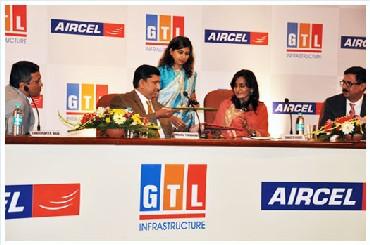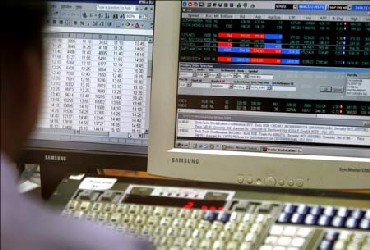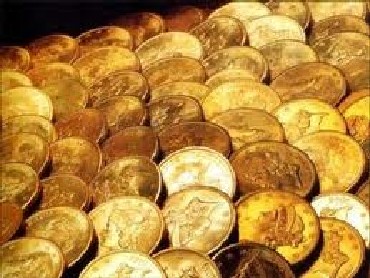Photographs: Courtesy, GTL Infrastructure Arijit Barman in Mumbai
A year ago, everybody complimented Manoj Tirodkar for his restlessness to grow and create value. Today, the same lot will turn around and say that is his millstone.
At a dinner banquet last year at the Taj Mahal rooftop - after successfully concluding a merger between Aircel's towers and group company GTL Infrastructure - Tirodkar was hailed as sagacious, humble and hands-on by a motley bunch of suave bankers, analysts and media persons.
Tirodkar, for most, epitomised the new entrepreneurial India, transcending his humble beginnings in the chawls of Mumbai's Girgaum as a charting broker in the shipping industry, and claiming his place in the Forbes rich list while rubbing shoulders with many of the Brahmins of the Bombay Club.
The same set are now blaming him for unbridled growth, stretched financials and dreaming too big, too soon.
. . .
From a Mumbai chawl to the Forbes rich list!
Photographs: Courtesy, GTL Infra
The punishment has been severe. Tirodkar's listed entities Global Telesystems Limited (GTL) and Global Telesystems Infrastructure (GTL Infra), two sister concerns with large holdings by foreign investors have been mauled by investors in the past week.
On Monday alone, GTL plummeted 62 per cent in one trading day, the second-highest fall in a single day in over a decade for BSE-500 stocks after the Satyam crash.
To put it in perspective, since last Thursday, the two companies together have lost Rs 4,420 crore (Rs 44.2 billion) in market capitalisation a 63 per cent erosion.
While GTL infrastructure owns the assets and earns rental income, GTL sells the equipment and offers other services to operators.
...
From a Mumbai chawl to the Forbes rich list!
As in the past, conspiracy theories abound. First there was speculation that foreign investors in the counter were dumping the stock on fears that Mauritius may start taxing capital gains.
Then there were whispers of corporate rivals hell-bent on launching an assault on the company and the fire sale was a precursor to a takeover.
Such gossip usually gets aggravated in the street, especially when it comes to GTL, as many still associate with Tirodkar's chequered past.
GTL's chairman is not new to controversy. At 27, he had become a poster boy of the dotcom boom in 2000-01, only until it later emerged that the stock was part of a pack of securities whose prices were jacked up artificially by the now-tarnished and banned operator, Ketan Parekh.
...
From a Mumbai chawl to the Forbes rich list!
A KP redux was also the talking point, and what was more worrying was the fact that Tirodkar was not buying up the falling shares to provide support. Was he, then, not confident of his telecom tower operations?
Was he out of cash? Were investors and institutions cashing out of the pledged shares that Tirodkar had parked with them to raise capital? The markets desperately wanted answers. Sadly, there were none.
The concerns of leverage Rs 10,000 crore (Rs 100 billion) on a consolidated basis are genuine. And, it's largely acquisition-led.
To put some numbers in perspective, GTL Infrastructure saw interest costs rise nine-fold to Rs 254 crore (Rs 2.54 billion) in 2010-11, from Rs 28 crore (Rs 280 million) the previous year.
This ate away most of the operating profit of Rs 323 crore (Rs 3.23 billion) made by the company in the last financial year. And once depreciation was added, it dragged the company into the red.
...
From a Mumbai chawl to the Forbes rich list!
There are additional pressure points: A likely redemption of $300 million zero coupon FCCBs, due in November 2012.
And bonds worth $228 million are still due. Most analysts have written off chances of the FCCBs getting converted, which means that they are likely to be redeemed for cash next year and the company will have to pay a 40 per cent premium and raise additional debt on an already overstretched balance sheet.
The possibility of a conversion seemed even slimmer, as the stock needs to multiply three-to-four-fold for that to happen.
Cash is tight and the macro situation in the telecom sector means that operating cash flows on incremental rental income will also be low.
...
From a Mumbai chawl to the Forbes rich list!
Investors are also discounting any immediate stop-gap arrangements. Plans for a $300 million QIP never really took off amidst volatile markets, and investors saw no clarity emerging out of GTL's talks with banks for a $400 million mezzanine financing facility to bridge the equity requirements.
All those who have seen Tirodkar or know him do admit that he has been a tad wistful in the recent past, bothered by the regulatory and policy climate in the country.
Will this first generation entrepreneur give up the fight? Will the towers collapse under the weight of debt?
There have been cases of turnarounds across India Inc maybe, just like his favourite teas, something is indeed brewing inside GTL's HQ, which not many are aware of.








article